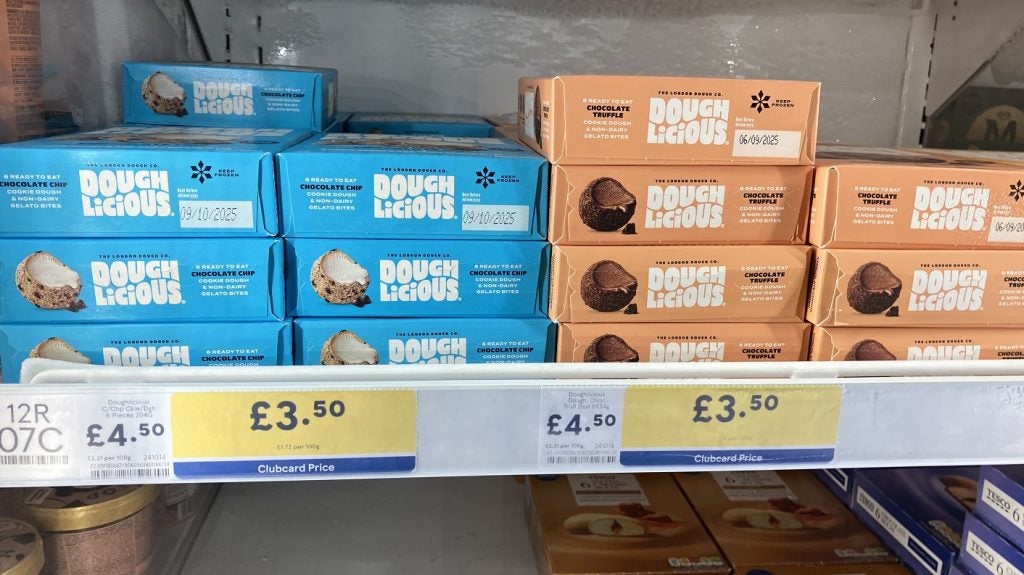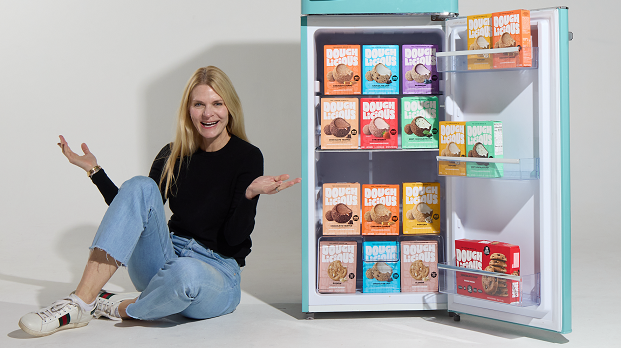Doughlicious is a business centred on cookie dough, marketing what the UK company says is a better-for-you version of the baked treat.
Set up in 2017, the company’s product range also takes in “bites” made from cookie dough and dairy-free gelato. In the UK, Doughlicious has listings with retailers including Tesco and Morrisons. The firm is stepping up its efforts on the other side of the pond, too, where it has secured national listings with Target.
Just Food hears from CEO and founder Kathryn Bricken, who believes the business can tap into demand for healthier, yet still indulgent, snacks.
Dean Best (DB): What does the new contract with Target do for your presence in the US?
Kathryn Bricken (KB): Last December, we launched in four regions with Whole Foods and then, in April, we went nationwide with Whole Foods. But Whole Foods is in the specialty market. Everybody shops at Target, so this has given us the opportunity to reach more individuals in the US through mainstream distribution.
DB: How many stores are you in with Target?
KB: We launch with 500 right now and then, in February, we launch in 1,700 for an end-cap promo. That’ll be for Valentine’s Day. We are nationwide, [with] Whole Foods. Five hundred.
DB: Have you got local manufacturing in the US?
KB: No, we only manufacture in the UK. Next week, I’m heading to the US to look at different options. Right now, we have capacity – we just finished renovations, put in a whole new spiral freezer, expanded the factory where our cookie dough foodservice ambient line is in one side and then all cookie dough and gelato bites are on the other.
To tell you the truth, when we looked at possibly finding a co-man in the US, it was more expensive with the tolling, the labour rates. It’s more expensive to produce in the US, especially when we [already] have our own factory.
Whole Foods was the perfect way for us to begin in the US because it’s big but it’s not massive. We could, kind of, test the waters, figure out how the containers would come over – they would land in Philly – and then how the products would move across the US. Let me tell you, it’s been very challenging. That whole frozen distribution chain was more challenging than we thought. It’s been a great way to get things fixed before we do expand our footprint in the US.
DB: I assume you will be looking at a different price point in Target?
KB: Yes, because we go direct to Target, we are able to keep our pricing lower than what it would be through a Whole Foods because for Whole Foods we go through distributor. In the US, we are $5.99 in Target and then in Whole Foods in the US, going through a distributor, we are $6.49 to $6.99, depending on the region.
DB: Would you agree Target’s interest supports the idea that more consumers are now becoming more interested in the links between diet and health and are looking for ‘better-for-you’ snacks?
KB: Yes, absolutely – and we want to be affordable. I want to be a snack for the masses. I don’t want to be a premium snack. Cookie dough has been around for such a long time and everybody knows it globally, so that’s why the snacks should be available to the masses. The more that we grow, our prices will probably just become more affordable just with volume.
DB: Have you got any other potential listings coming up in the US in 2025?
KB: We’ve just also launched in Harris Teeter. Fresh Direct, various independents and we’re hoping that we will have Hy-Vee, Albertsons. Our goal is to double the size of our footprint in the US next year. The UK is still our largest market for this year but next year the US should be a large market for us.
DB: Is the US your biggest market outside the UK presently?
KB: Well, I guess that depends on the day. We’ve had some challenges in Australia. Australia would have been but right now we’re facing some challenges with just labelling, technical. We’re waiting for POs to come through just because of some technical issues. We changed our packaging. We’re just launching in Costco Australia in the next couple of months. We’re about to fill the container for that.
The US will be our first priority, along with the UK. The UK will always be our mothership. We do sell into other regions. We love sharing our dough and it’s really important for us to again be present everywhere but we also have to prioritise, so the UK and the US are our main markets. We also sell into Switzerland and the Netherlands. We sell foodservice in France. We’re in Saudi Arabia. Those will be markets that will have a broker, they will maintain the relationships and we will just ship the product there.
DB: What’s your proposition for Doughlicious when you talk to potential customers?
KB: I think it comes down to the cookie dough. We are a cookie-dough platform. We are a cookie dough that’s better-for-you but tastes amazing, has won awards, and it’s relatable to the consumer, as opposed to some other things. I mean, you could easily enrobe with chocolate, there’s mochis out there, which are chewy, but what we do is something that people have loved all their lives and we now put the two things together as a gelato bite – or you can just have our cookie dough to bake at home. You can feel good about eating it and snacking on it because everything has about 100 calories. We support moderation and we support less food waste, so bake or grab out of the freezer what you’re going to eat and then save the rest for later.

DB: You’ve recently been on promotion at Tesco through the retailer’s Clubcard programme. Is this market of ‘better-for-you indulgence’ becoming more competitive? Are you having to invest more in promotions?
KB: Well, I think we stick to a strong promotion plan and we do what we can to support our trade spend. We work with the buyers to make sure we’re doing everything we can. Of course, we don’t want to be on promotion too much because then people will only buy us on promotion. We want the customers to try us, give them a good price and then they’re going to fall in love with us. Then we’ll be off promotion and hopefully they will continue their purchasing habits and then get excited when we go back on promotion and try new flavours. I think it’s a healthy thing that we’re doing right now. I do see more competition coming into the marketplace but I think we hold our own being unique, different, handheld. We are the only cookie dough snack that is better-for-you in the category.
DB: When you speak to consumers are you picking up on an increasing awareness of ingredient lists and product recipes?
KB: Well, I mean, it’s important to me. I’m my own worst critic and so, yes, I always look at what the industry is doing but most of all I focus on us as a brand and the shortening of the label is always a priority to me. The cookie-dough labels are very short. Sometimes when you get into the dairy-free gelatos, it’s a little more difficult but something that we are constantly working on. I am continuously pushing for shorter labels because I read labels and I think a lot of people do. People are more conscious about what they’re eating and it’s important for them to understand the label and know what’s going into their body
DB: Do you see a shorter label as something that could give Doughlicious a bit of a competitive edge?
KB: Yes, I agree. But there’s a lot of – sometimes, getting a product when it needs to be stable and stay fresh, it’s difficult.
DB: Broadening that out a little bit more, how concerned are you that the debates around ultra-processed foods could weigh on your sales?
KB: Our product is processed in a factory, we use oat flour, we don’t use any white sugar, we don’t use any white flours in our factory. Everything is clean. We have Marks and Spencer; we manufacture some products for them and they’re in our factory, checking in. Everything is on an A list for ingredients. We don’t have any E numbers, no additives, no preservatives, no added refined sugars.
DB: What is the extent of your private-label business?
KB: Only for Marks and Spencer and a couple of retailers in Germany. We will keep our private-label business to under 20% of our business.
DB: What about foodservice?
KB: Yes, in the UK, we sell into different restaurants and facilities. We’re in Tottenham’s stadium, Twickenham stadium, Wembley. We manufacture for Bella Italia. We want to continue to expand that range and, anything we can do branded, it’s fantastic for us.
DB: Will grocery retail remain the majority of your sales moving forward?
KB: Yes, I mean, growing the brand is our main priority and making sure that people recognise Doughlicious, when they hear the name, they know who we are. We’re just launching a line of baked, stable, ambient cookies. They’re on LNER train lines and they’ve done so fantastic that we’re now moving them out into further retail. They have a six-month shelf life. They don’t have any E numbers or preservatives. They’re a soft, American-style cookie.
DB: Earlier this year, you raised £3.5m ($4.6m) with Triple B. It sounds as though the vision is for you to be a household brand. To what extent are you going to need more funding to help you achieve that?
KB: Well, I’m hoping that I can keep it going for a little while without needing any more funding. I think when we grow out the US further, we will have to do another round but, right now, the goal is to keep costs under control, stick to the budget, grow the brand, reinvest in the brand and try not to need any more money for a little while. It’s hard. Everything’s expensive.
DB: How much have you raised so far?
KB: I think we’ve raised about £7m from friends and family.
DB: Are you still the majority shareholder?
KB: Yes, I try hard to keep that.
DB: Is the business profitable yet?
KB: Well, it depends how you define that. Is there revenue? Yes. Are we growing? Yes. Are we EBITDA positive? No but should be in probably Q1 ‘25. Right now, I mean, just alone the factory, having your own factory, there’s pros and cons about it, right? It gives us the ability to maintain quality, innovate, which is huge. How many brands can innovate as fast as we can? Unless you have your own factory, you just can’t do it. The con is machinery, labour, a lot of things can go wrong.
DB: So, when you go out to the US to look at your options, how likely do you think it will be that you’ll sign up a co-manufacturer, or maybe even look to set up your own factory? Is that many years down the line?
KB: I think we’ll look to start something probably beginning like Q1 ‘26. ‘25 we’ll be able to maintain and continue doing what we’re doing, continue to ship over.









